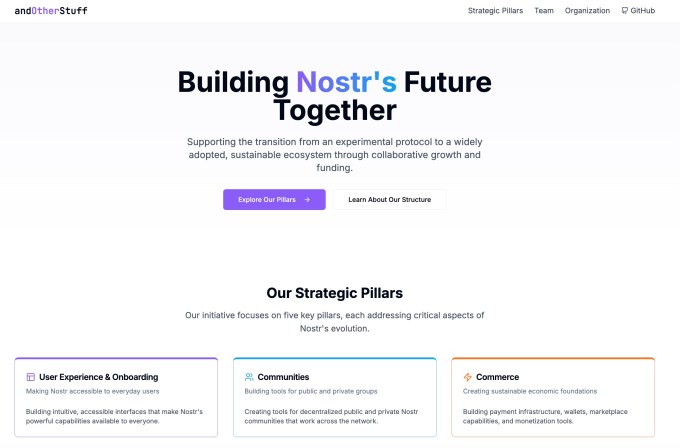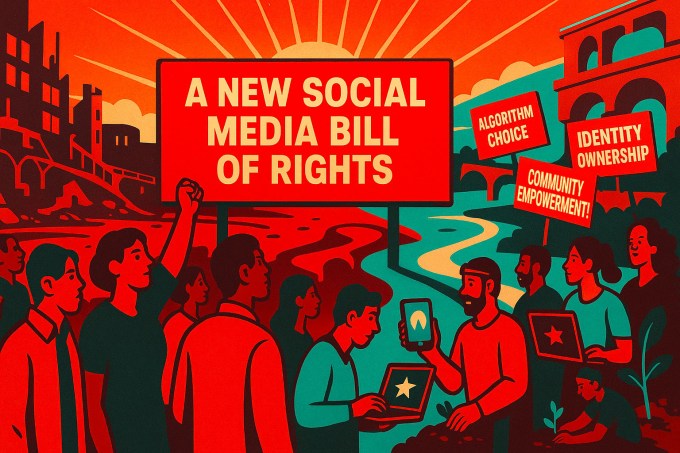Jack Dorsey, the co-founder of Twitter and CEO of Block, is not just creating new social media applications like Bitchat and Sun Day. He has also made a significant commitment of $10 million to support groundbreaking open-source projects and tools that could potentially reshape the social media landscape.
His initiatives are channeled through a collaborative network named and Other Stuff, established in May, with a team featuring notable figures like Dorsey, Twitter’s first employee Evan Henshaw-Plath, Calle, the visionary behind the e-cash platform Cashu, Alex Gleason, former engineering lead at Truth Social, and Jeff Gardner, one of Intercom’s earliest team members.

The team initially collaborated on Nostr, an open-source and “apolitical” social networking protocol that has attracted most of Dorsey’s focus since Twitter’s acquisition by Elon Musk and his departure from the Bluesky board. They also plan to explore other technologies, including ActivityPub, which powers the decentralized application Mastodon and others, as well as Cashu.

In recent years, Dorsey has expressed his concerns about the evolution of social media platforms, stating that Twitter should never have been a company and that Bluesky appears to repeat the mistakes made at Twitter.
Consequently, the “and Other Stuff” team is committed to fostering a community of hackers rather than creating a traditional company, as Henshaw-Plath explains. They are dedicated to building technologies that encompass new consumer social applications and various experiments, including developer tools and libraries, enabling others to create their own apps.
One example is their app Shakespeare, designed to facilitate the creation of Nostr-based social apps with AI support, akin to the app-building platform Lovable.

Additionally, the group is responsible for heynow, a voice note application built on Nostr; the Cashu wallet; a privacy-focused messenger app White Noise; and the Nostr-based social community +chorus, among other projects Dorsey is developing.
Tech and VC heavyweights join the Disrupt 2025 agenda
Netflix, ElevenLabs, Wayve, Sequoia Capital — just a few of the heavy hitters joining the Disrupt 2025 agenda. They’re here to deliver the insights that fuel startup growth and sharpen your edge. Don’t miss the 20th anniversary of TechCrunch Disrupt, and a chance to learn from the top voices in tech — grab your ticket now and save up to $675 before prices rise.
Tech and VC heavyweights join the Disrupt 2025 agenda
Netflix, ElevenLabs, Wayve, Sequoia Capital — just a few of the heavy hitters joining the Disrupt 2025 agenda. They’re here to deliver the insights that fuel startup growth and sharpen your edge. Don’t miss the 20th anniversary of TechCrunch Disrupt, and a chance to learn from the top voices in tech — grab your ticket now and save up to $675 before prices rise.
|
October 27-29, 2025
The advancements in AI-driven coding have made such experimental endeavors feasible, as Henshaw-Plath notes, similar to how technologies like Ruby on Rails, Django, and JSON catalyzed the rise of the earlier web, known as Web 2.0.
In line with these initiatives, Henshaw-Plath and Dorsey discussed their vision in the inaugural episode of Henshaw-Plath’s new podcast, revolution.social with @rabble. (Henshaw-Plath’s handle on X is @rabble.)
Dorsey, residing in Costa Rica, and Henshaw-Plath, based in New Zealand, met at a hackathon in Switzerland for this insightful discussion. During the nearly hour-long episode, Dorsey reflects on Twitter’s trajectory and shares his insights on the pitfalls of social media and how they might be remedied.
“I took a long time to realize this… I didn’t articulate it until my second return as CEO. It’s challenging for a platform like [Twitter] to function as a business when it aims to be a protocol,” Dorsey explains. He acknowledges that Twitter was beholden to its advertisers — a situation Musk currently faces with X, despite taking the platform private. Musk has even threatened advertisers with legal action over boycotts stemming from their concerns regarding X’s moderation and Musk’s own controversial remarks.
While Dorsey recognizes that catering to advertisers was essential for the business and Twitter’s stock performance, he believes it was detrimental to the internet as a whole. “Advertisers have the power to withdraw their funding — your funding — and your revenue can plummet completely,” Dorsey states. “If [Twitter] were an open protocol, a genuine open project, you could establish a business on it, and it could be a thriving enterprise.”
Dorsey initially funded an initiative to create an open protocol within Twitter, which subsequently evolved into Bluesky. However, he feels Bluesky grapples with similar challenges as conventional social media due to its funding structure — supported by VCs like many startups. It has already had to accede to government requests and navigate moderation issues, he points out.
“I think [Bluesky CEO] Jay [Graber] is excellent. The team is impressive,” Dorsey told Henshaw-Plath. “Yet, I disagree with the structure… I want to direct my energy towards something more akin to Bitcoin, which is entirely open and not owned by anyone at the protocol level. That’s the vision I see for Nostr as well. That’s where I want to channel my efforts… away from a more corporate direction, even if it’s a public benefit corporation,” he adds.

In forthcoming episodes, Henshaw-Plath will engage with various personalities who have valuable perspectives on the evolution of social media and technology, including journalists like Kara Swisher and Taylor Lorenz, former Twitter head of Trust & Safety Yoel Roth, Substack co-founder Chris Best, Medium CEO Tony Stubblebine, Cory Doctorow, who coined the term “enshittification” to describe the state of modern web platforms, and well-known misinformation researcher Renée DiResta.
The “and Other Stuff” team is also developing a social media “Bill of Rights,” as stated by Henshaw-Plath, which outlines essential provisions that social media platforms must meet in areas such as privacy, security, interoperability, transparency, identity, self-governance, and portability.
This initiative aims to ensure that platforms, including Bluesky and others, remain accountable to their users despite external pressures.
Dorsey’s initial funding has jumpstarted the nonprofit, and he has contributed to the development of several initial iOS applications. Meanwhile, others are dedicating their efforts to create Android versions, developer tools, and other social media experiments.
More exciting developments are on the horizon, according to Henshaw-Plath.
“There are innovations we’re not ready to disclose yet that will be incredibly thrilling,” he hints.




